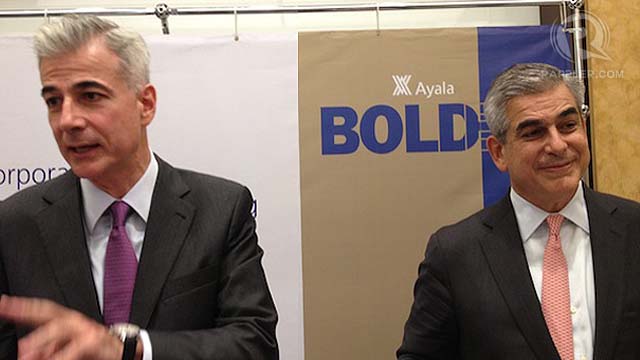SUMMARY
This is AI generated summarization, which may have errors. For context, always refer to the full article.

MANILA, Philippines – Top executives of Ayala Corp, the Philippines’ oldest diversified conglomerate, said they are exploring options in Myanmar.
Speaking at a press briefing held after the conglomerate’s stockholders meeting on Friday, April 19, Ayala Corp chairman and CEO Jaime Augusto Zobel de Ayala described the former hermit kingdom as “the last piece on the Asean puzzle.”
“We already managed to get a foothold in Vietnam and Indonesia. Myanmar is the last piece on the Asean puzzle. The fact that it’s shown signs of becoming part of a regional integration story has been an exciting one,” Ayala said.
“We’re far from making any big moves but like everything in life you have to learn to get to know a place and build relationships and we’re starting in that process. If opportunities arise we would like to be a part of it,” he added.
According to Ayala, they’ve sent a number of teams to Myanmar. The conglomerate is particularly interested in looking for opportunities in real estate and banking.
However, nothing yet is confirmed and their interest in the region is only of exploratory nature.
“Myanmar is the last country in Asean to open up. It’s in the process of modernizing itself and opening itself up to foreign investment. Our job is to get comfortable with the country. We are beginning to understand the nature of the government structure, regulatory structure where the opportunities lie,” said Ayala.
International expansion
According to Ayala, the countries that make up the Association of South East Asian (Asean) countries play a big part in their international expansion plans.
“We’re excited by what is happening in Asean, which has become increasingly intertwined. There are a lot of new investment interest in the countries and they’re moving towards a new free trade environment by 2016. From the Ayala group perspective, that is exciting for us,” said Ayala.
The conglomerate’s water services arm, Manila Water, recently announced its strategy to focus on the VIP countries (Vietnam, Indonesia and the Philippines) in its future expansion plans.
Ayala Corp president and COO Fernando Zobel de Ayala said they are in no rush in entering Vietnam.
“We’re long term players. We’ll do things gradually. We’ll probably look at an initial activity to go into and then build up on that. In Vietnam, for example, we did a very small project of US$1 million in Ho Chi Minh relating to water before we proceeded to invest $100 million,” he said.
This comes as a number of Filipino conglomerates express their interest in the newly opened up Myanmar market
The food and beverage arm of the Gokongwei group, Universal Robina Corp. (URC), on Thursday April 18 announced plans to enter Myanmar market over the next two years.
Vice Chairman and CEO Lance Gokongwei said they plan is to set up manufacturing facilities in Myanmar with an investment of $20 million to $30 million.
“It’s a long term play. Myanmar is rapidly transforming into another tiger like Vietnam or the Philippines. It’s got certain advantages: a large population of 50 million, a very good location in Asia and a lot of inherent natural resources and beauty from its tourism product,” said Gokongwei, who was at the annual meeting with his father, tycoon John Gokongwei Jr.
Risks and rewards
Myanmar has just recently opened itself up to foreign investors after being closed for nearly half a century under military rule.
Foreign investors have been rushing in to take advantage of the abudnace of natural resources and opportunities presented in a country that is almost building itself up from scratch, but it doesn’t come without risks.
“Due to its location, population and resources Myanmar is the holy grail for frontier investors, but it is still early in its reform process,” said Douglas Clayton, founder and CEO of Cambodia-based Leopard Capital in a previous interview with Agence France Presse.
”There are severe capacity constraints in human resources and physical infrastructure. Myanmar is simply not ready to absorb the tidal wave of projects foreigners can imagine starting there,” he said.
While the majority of Myanmar’s industry is controlled by companies owned by the government or their cronies, there are plentiful opportunities for foreign companies in the country’s oil, gas and other natural resources. – Rappler.com
Add a comment
How does this make you feel?
There are no comments yet. Add your comment to start the conversation.